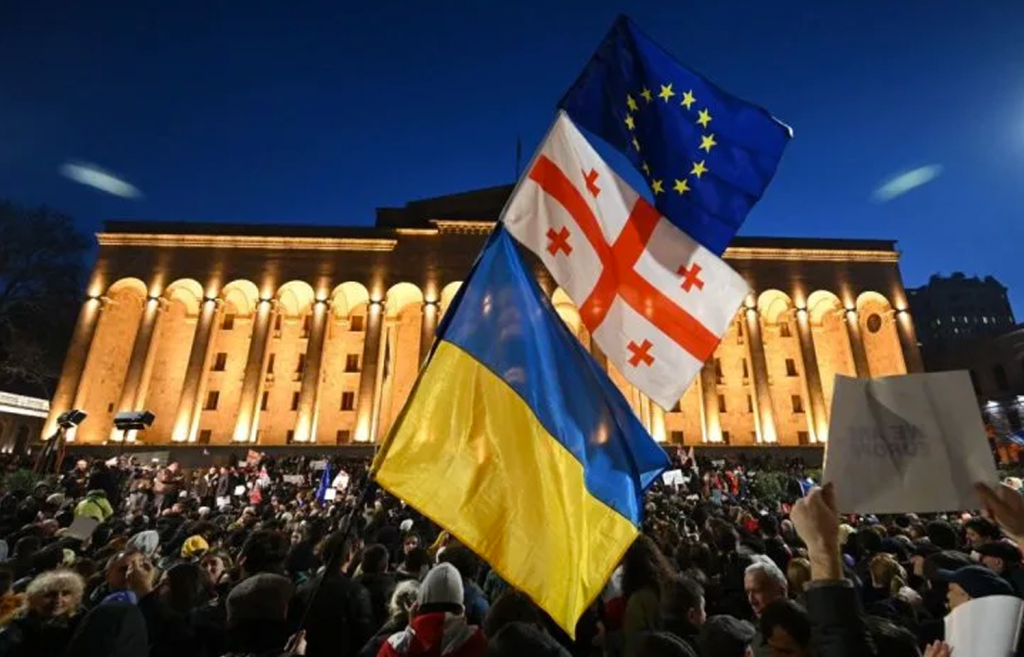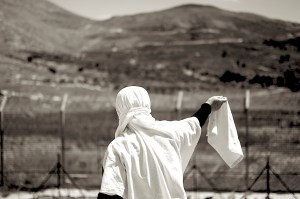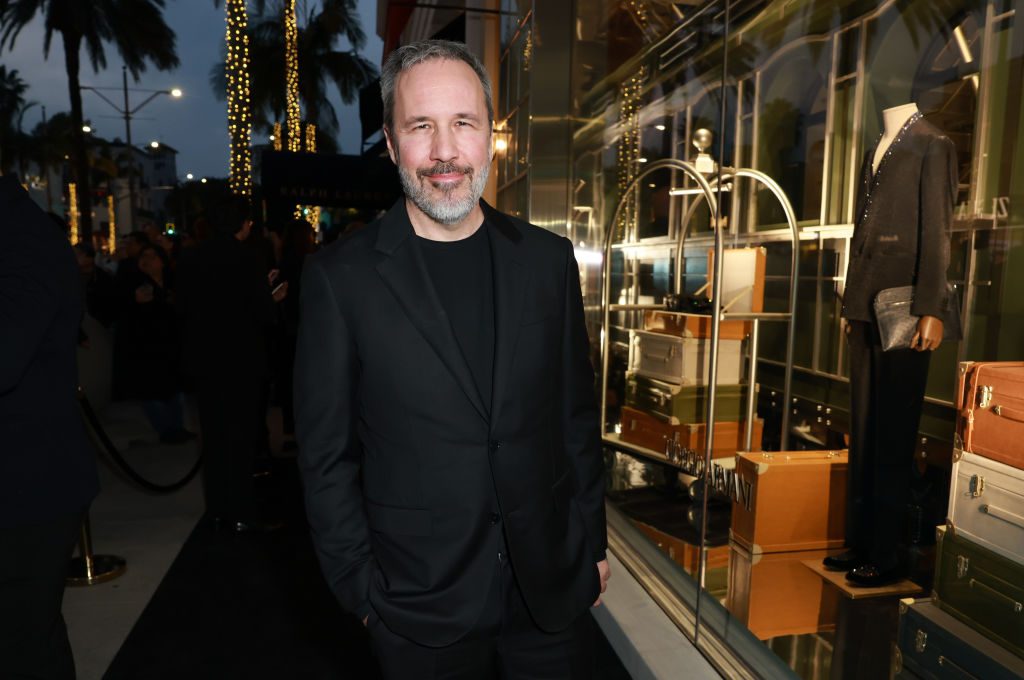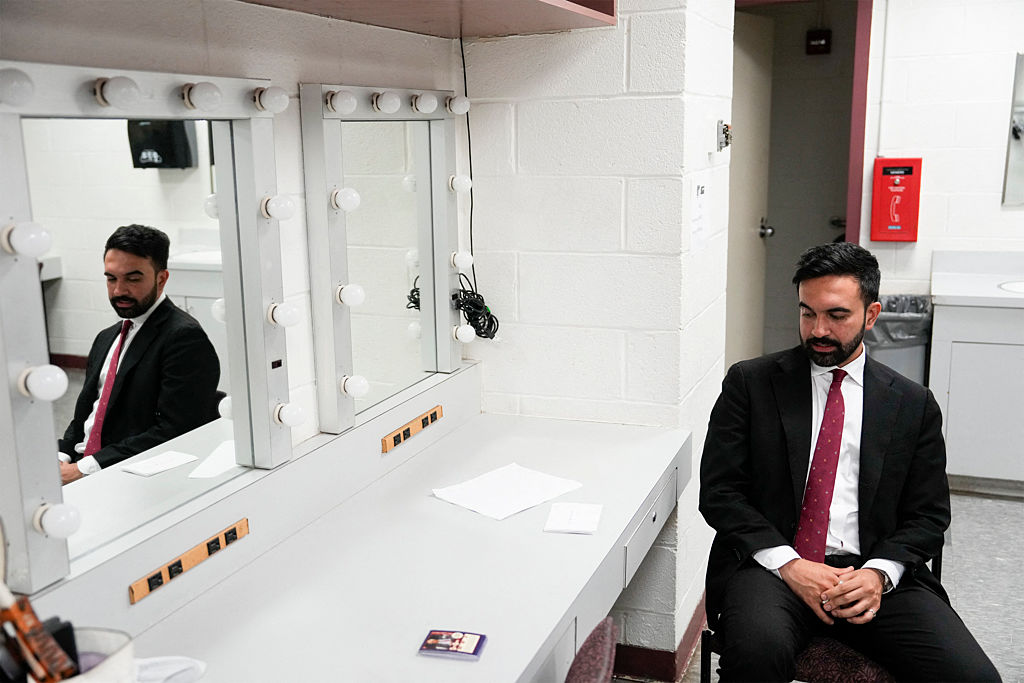On the face of it, the protests that rocked the Georgian capital of Tbilisi last week looked a lot like recent regional history repeating itself. Just as in Georgia’s own Rose Revolution in 2003 or Ukraine’s Orange and Maidan revolutions of 2004 and 2014, vast crowds waving EU flags took to the streets to demand democratic change, to be met with police baton charges, tear gas and water cannons.
The cause of last week’s protests was a law passed by Georgia’s parliament requiring non-governmental organizations that received funding from abroad to register as “foreign agents” — a requirement that looked uncomfortably similar to a longstanding Russian law which has been used by the Kremlin to crack down on civil society organizations and political opposition. Many protesters were also supporters of former president Mikheil Saakashvili, imprisoned since 2021 on charges of “abuse of power” that many saw as politically motivated. Saakashvili is gravely ill in prison hospital after a hunger strike — and possibly suffering from the effects of poisoning, his supporters claim.
In Tbilisi, despite determined assaults by police, the protesters won. The foreign agent law was defeated on its second reading, and Georgia’s largely figurehead President Salome Zourabichvili even congratulated the protesters for their “commitment to democracy.” But the underlying reason for the protests remains unresolved: how to balance Georgia’s relations with Russia with its stated commitment to join Europe, and how to restrain the authoritarian tendencies of successive Georgian governments.
Since the Rose Revolution of 2003 that brought the passionately pro-western reformer Saakashvili to power, every Georgian government has been notionally committed to joining both the European Union and NATO. Indeed Georgian Dream — the ruling party since 2012 which introduced the controversial foreign agent legislation — recently made a major step towards that goal when Brussels gave Georgia and Moldova formal candidate status last year. But at the same time the Georgian economy remains heavily dependent on trade with Russia, where nearly half a million Georgian citizens. or close to 15 percent of the population, live and work. As a result, Georgia’s government has not joined international sanctions imposed on the Kremlin in the wake of Russia’s invasion of Ukraine.
The Kremlin, for its part, remains determined to keep Georgia as close as possible to its sphere of influence. Russian foreign minister Sergei Lavrov in January praised Tbilisi for not succumbing to western “pressure” to impose sanctions against Russia. “The fact that a small country and its government has the courage to say that they will be guided by their own interests, by the interests of their own economy — that inspires respect,” he added. And when protests engulfed Tbilisi last week Lavrov was quick to point the finger at a western plot to overthrow a government that was imperfectly toeing the Washington line. “There is no doubt that the law on the registration of non-governmental organizations… was used as an excuse to start, generally speaking, an attempt to change the government by force,” Lavrov said. The protests “are of course being orchestrated from abroad” with the aim of creating “an irritant on the borders of Russia.”
In truth there is very little actively pro-Russian sentiment in Georgia — and Russia’s 2022 attack on Ukraine stirred angry memories of Vladimir Putin’s first foreign invasion when he occupied the breakaway Georgian republics of South Ossetia and Abkhazia and ordered Russian tanks to within twenty miles of Tbilisi in 2008. But “though Russia knows it cannot run Georgia they can hope to destabilize it,” says old Georgia hand Lawrence Sheets, president of the Eurasian International Analytics consultancy.
Over the last few years EU-provided development funds for Georgia have found their way into the pockets of Russian businesses — for instance a $50 million European Bank of Reconstruction and Development-funded contract to provide rolling stock for Tbilisi’s Soviet-built metro system went to Russia’s Metrovagonmash in 2021. Other funds were used by the Georgian Interior Ministry to buy facial recognition software produced by Russia-based Papillon and fingerprint software made by Belarusian TODES. Most importantly, Lavrov has recently raised the possibility of restarting direct flights between Russia and Georgia which were suspended after a political row in 2019. The Georgian Dream government favors resuming flights because Georgian expatriates in Russia are a valuable constituency — and will provide even more opportunities for Georgian companies to profit from sanctions-busting trade with Russia. The opposition opposes reinstating direct air links for the same reason: more economic integration with Russia will slow momentum towards integration with Europe.
In the aftermath of Putin’s invasion of Ukraine a massive influx of Russians — both anti-Putin activists and less politically motivated draft dodgers — flocked to Georgia, one of the few countries in the world that offers visa free residency to Russian citizens. Estimated at between 100,000 and 200,000 strong in a country of just 3.7 million, this new wave of emigration has proved controversial as rents, restaurant and food prices have skyrocketed. But there has also been political resentment over the fact that these Russians preferred to flee rather than battle the Putin regime at home. “No Russians welcome here, good or bad!” was scrawled in English on a wall in Tbilisi last October and widely shared on social media. The Georgian Dream government has also been accused of pandering to the Kremlin when it refused entry to several prominent Russian journalists and political activists.
But what worried the largely young, passionately pro-European protesters most about the foreign agents law was that the government seemed to be planning a Kremlin-style crackdown on political dissent. “There are concerns that Georgian Dream wants to turn the country into a one-party state,” says Thomas de Waal, a senior fellow at Carnegie Europe. In that sense, the mass protests were a success — though Irakli Kobakhidze, chairman of the Georgian Dream party, defiantly insisted that “being an agent is shameful no matter whose agent you are” and called Georgian NGOs “agents of foreign influence” even as he withdrew the law. Saakashvili, however, remains dangerously ill in jail.
The good news for Georgia is that the protests signal that a new generation is not just engaged but passionate about their own future and freedom. The challenge, though, both for Georgian Dream and whoever eventually replaces them in power remains unchanged: how to juggle the country’s deep economic dependency on Russia with the Western-leaning political aspirations of its younger voters. And more profoundly, how to manage growing closer to NATO without provoking an invasion by its massively more powerful northern neighbor a second time.
This article was originally published on The Spectator’s UK website.

























